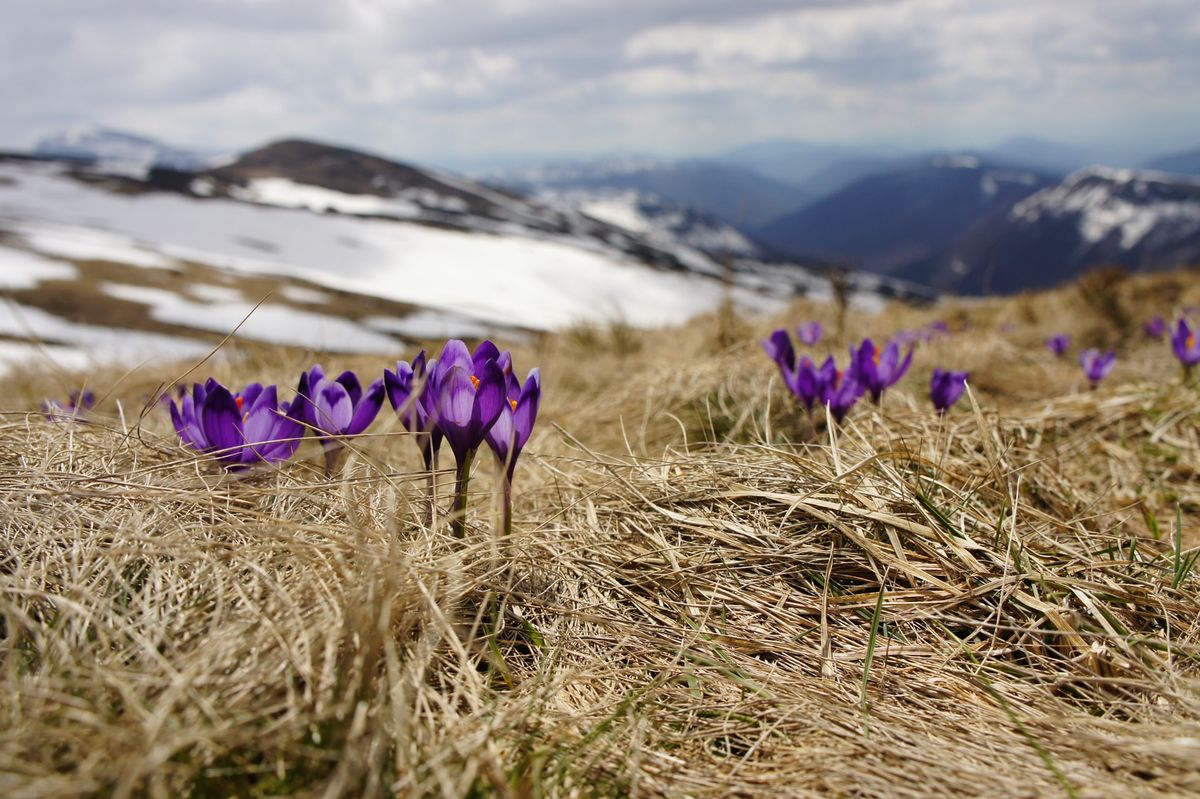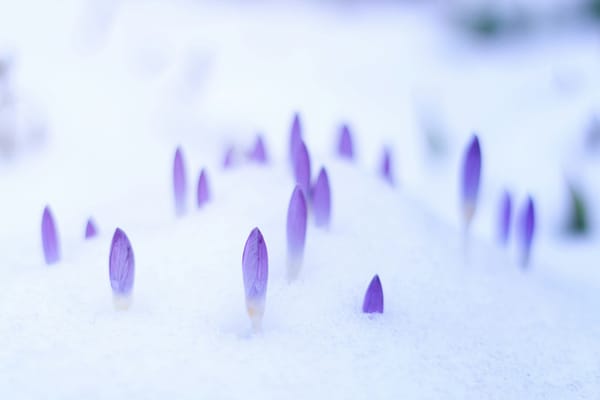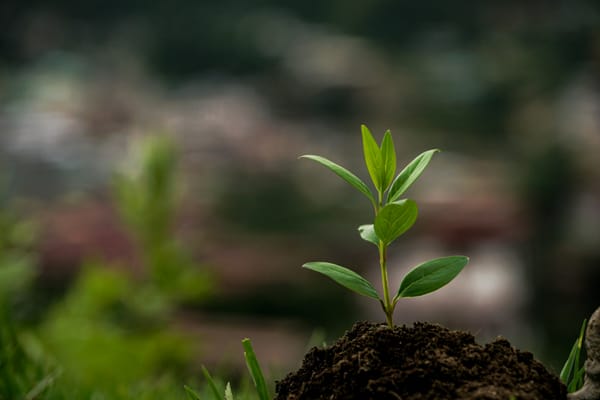a season of endings
People are leaving. Sometimes it is the longing for a land they once lived in and loved. Sometimes death takes them away. Every departure brings a fresh wave of grief.

My neighbours, a couple in their seventies, are moving back to their hometown in Macedonia after having spent three decades building a life in Canada, 20 years of which they spent in the house right beside mine.
They'll be gone within the next couple of weeks.
They'll be gone before April turns into May.
They'll be gone before the weather is warm enough for them to resume their summer ritual of spending their days in their front yard, basking in the sunshine, inviting friends over for a meal and a smoke and drinks, their voices drifting up and into my open windows, their conversations in Macedonian incomprehensible to me but sounding like a familiar and soothing melody like the many languages of the country I grew up in, their door wide open all day long, an invitation – to anyone who wanted to take them up on it – to enter and spend some time with them, talking about the weather, about life.
Someone else will take up residence there in their stead – their friends, I am told, another middle-aged Macedonian couple – and who knows if they too are fond of open doors and open hearts?
Their constant presence next-door has been a salve for me in the past four years we've lived in this home beside theirs, only two wide strips of lawn separating our abodes. As a mother of a young child, I put myself under constant pressure to do more and more for little D, and was often anxious that I was unable to meet my very high, self-imposed expectations and standards when it came to parenting and being human.
The sight of my neighbours, John and Natasha, simply enjoying each day without striving to make something special and extraordinary of it often gave me much-needed perspective. That it wasn't so much about pushing myself to do what other parents seemed to be doing so effortlessly – setting up playdates, taking the little one to community centres or any of the countless places to afford opportunities for socialization, worrying about not being able to do as much as I wanted to, worrying that I wasn't doing enough – but it was about honouring the situation I am in and making the most of what I have and what I could do, even if it was sitting in the yard with my little one and all it took were a few stones and sticks and bucketfuls of water to keep him enthralled.
In their presence, I could shrug off the weight of my own expectations and disappointments. In their presence, I could breathe easily.
When I learnt earlier this year that they were all set to leave, I cried for an entire day. The tears would simply not stop flowing. I have since then realized that to me, there is something about a matriarchical or a patriarchical figure, the presence of a wiser, older person, that I find reassuring.
When I find an older role model who has gone through 60–70 years of life and has emerged on the other side, still full of light and love and joy and kindness, it kindles hope in me.
It reassures me that no matter how difficult or unbearable life may feel in this moment, I can go through this period with grace and emerge with my love for life intact.
But even the wisest, kindest, and most precious of people leave.
"Even my neighbour is my friend in Macedonia," John said to me yesterday. I can't recall the number of times Natasha has empathized with my plight, every time I admitted to her the difficulties and loneliness of bringing up a child by ourselves, so far away from the rest of our family back in India. When she lived and worked in Macedonia, the entire neighbourhood was the village that helped bring up her children, she used to say. And it is for this connection with other human beings that they've made the decision to go back to their hometown.
Their journey is eerily similar to that of my parents. After almost 40 years of living in Maharashtra, my parents, now in their seventies too, moved back to a suburb of Chennai in the state they were born in and grew up in.
Growing up, almost every summer we made the trip to Chennai to stay with our relatives for a month. But I see now how those trips failed to fill that hole that had been forever carved out of my parents' hearts, a hole that could be plugged somewhat only after they dropped the curtain on a 40-year chapter of their lives and returned 'home', to their land, to their people. To their childhoods, in a way, I reckon, or at least to something that vaguely resembled those initial few years after birth, when one more readily believed in possibilities than in limitations.
John tells me he moved to Canada so that his children would have access to better education and prospects in life. It reminds me of my own adolescent ambitions, mine and my brother's, instilled in us by every well-meaning adult we encountered as we grew up – to make our way to the west, to the land of the free, the land of the rich, the land of meritocracy and progress, the land of efficiency, the land of ethics and honesty.
And now that we are here, it doesn't feel freer or richer than the home I left behind, it doesn't feel like growth and progress in any sense of the word, and my heart pines for what it has left behind. The warmth of connection. The comfort of family. The knowledge that what we had could have been enough, and that it was not necessary to hanker for something more or something different all the time.
But of course there is another reason that I feel so strongly about home and family today, something that I have been dithering from writing about, because it is too close, too personal, too raw. It's this.
The deceased in the news report is KrA's first cousin. We don't know much more than the news report itself states, but since we received news of the incident on Sunday, this distance of three continents and two oceans between India and Canada feels like it has suddenly become way too vast and unbridgeable.
I want nothing more right now than to go and be with the family, but these utterly manmade rules of passports and visas make travel impossible for the time being.
And so we are here, alone with the pain of losing a loved one, unable to reach out and comfort his parents and his sister as they mourn the loss of their son, their brother.
Eleven years ago, a paternal first cousin of mine passed away in similarly unexpected circumstances. He was in the US, playing cricket with his friends, when he collapsed. And before he could receive much help, he was gone.
Then, just as now, there was a lot of logistics involved in the transport of the mortal remains across three continents and two oceans so the family would have the opportunity to carry out the cremation and the final rites, and bid farewell to the one they loved and lost.
In this moment of grief, waves of nostalgia and homesickness wash over me, even though I have seen and learnt enough to understand that when we miss home and family, what we truly seek is understanding and acceptance. We think it is to be found in the midst of family or in the land of our childhood.
And perhaps, to a large extent, reconnecting with family or our homeland may indeed be the salve we need in the moment. A reminder that we need not shoulder the burdens of life alone. A reminder that no matter how different and difficult our journeys may be, at the root of all our longings is that simple human need to be loved and accepted and celebrated for who it is we are.
But it is just as easy to forget that family and culture too could cause us, even if inadvertently, to turn away from our true selves if that's what it takes to fit in, to find understanding and acceptance by way of submission and obedience.
For unless we are able to give our own selves the gifts of acceptance and belonging, no one and nothing on the outside – not even family or homeland – can give us what we so desperately seek.
As I stand here, feeling small and scared like a little child, wistfully longing for another older, wiser figure to appear and stand by my side as I navigate life, to cheer me on and celebrate my successes and encourage me through my downfalls, I realise that I have only myself to fulfil this role, both for me and for my little one, D.
We have to be that which we seek.
And we are only human, so we are bound to fail at this way more often than we'd like to, there is no escaping that.
For a long time, I had known and understood this intellectually but I hadn't known how to be that wiser self, which is capable of nurturing that part of me that feels lost and scared and longs for care and connection.
I have been listening to Tara Brach's talks for more than a year now, and in all her talks she includes a brief meditation based on the R.A.I.N. (recognize, allow, investigate, nurture) method of feeling our feelings in our bodies. In the nurture component, she asks us to imagine a higher self or any other being – could be a loving grandmother, a God if we believe in one, a spiritual person we look up to, a child, a dog, essentially any being that we trust can show us unconditional love and acceptance – and to further imagine ourselves being that wiser self, offering love to the hurt self, by placing a hand on the heart, or even by saying "It's OK" or "This too belongs."
This is a technique that has been helping me immensely, especially when I find myself reaching out to something or someone on the outside for love.
This is not to diminish the value of a good conversation with a friend or an open-hearted chat with a loved one, but everyone we reach out to is also human with their own foibles and constraints and may not always be able to tend to our needs as we'd like them to.
Whereas the presence of our own wiser self is constant, we can access it anytime, anywhere, we only have to remind ourselves to do so.
We are all we need. Often, we have to meander through several heartbreaks and disappointments before we can come back home to ourselves. But that wise self of ours is always there, waiting, like a parent waiting for a child to come back home after an entire day spent at school. That reunion is then a most joyful one.
Image Attribution: Photo by Biegun Wschodni on Unsplash




